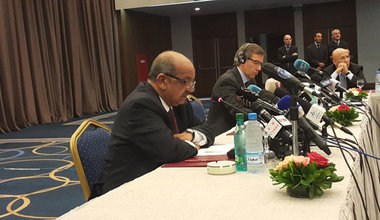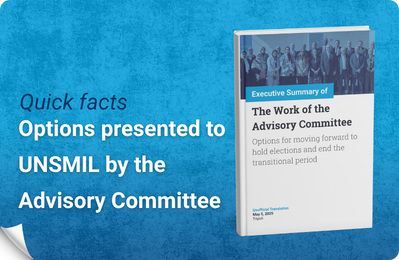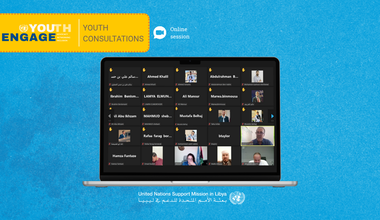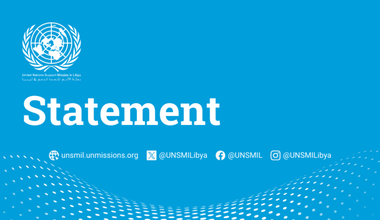SRSG Leon’s Opening Remarks at Libyan Political Leaders, Activists Meeting in Algeria, 03 June 2015

Our meeting is starting between two very important moments on the one hand behind us is these long months of meetings of dialogue proposals, which after a very strong effort and very important contribution from all the members who are in this forum should reach a conclusion.
And there are only two possible conclusions: either to propose an agreement or to acknowledge that Libya cannot reach this agreement and should continue the war. But in fact I think I have listened to the message from you and from many other Libyans that the second is not an option, that not to reach an agreement and to continue the confrontation is not an option.
So if the only option the country has, the only real alternative, for the future is an agreement. This is moment of truth. The other important date which is framing our meeting today is Ramadan. We are approaching the sacred month of Ramadan, a moment of peace, a moment of reconciliation, a moment for the families to get together and celebrate together and I think this is always said about all the countries in the world, and especially true in the case of Libyan.
Libyans are a family. It's not a big population. It's a small population where people have a lot of strong links and this forum represents very well this large family that Libyans are. So we are approaching this time of peace and reconciliation where no more shootings, no more confrontations, where dialogue and gatherings of families should replace what we have seen in the past year. I think we all agree that the time has come to send a very strong message, for all of us and for the ones in Libya, for the ones in other tracks that it is high time to take decisions.
The country - we have repeated that many times but now it is more true that ever – the country is really at the limit.
Let me start with the economic situation. The Central Bank of Libya and the administrations will not be able to continue to pay salaries for a long time, maybe one month, maybe one month and a half after that the financial situation in the country will not be able to keep Libya's functioning state as a functioning administration. And this works for all sides, for all regions, for all cities in Libya. Oil production has dropped but even if the oil production recover its normal, average production will not be able to sustain the budget deficit that Libya needs to have in order to sustain its public finances.
Politically, the situation has continued in a similar way, with the competing institutions, the competing governments, not advancing not flagging very clearly a decision to reach an agreement while we have seen terrorism, we have seen Daesh becoming more and more important in the country.
If the people involved in the different tracks, in the different dialogue forums don't understand this message very clearly and continue to try to get more concessions from the other side without understanding that Libya has reached the limit the result will be that Libya will become a failed state.
Let me enhance this security situation. Let me enhance the paradox that now, today, we have people in both camps fighting Daesh. It is a real paradox that requires a lot of reflection because it shows very clearly that those who have been accusing Fajr Libya of being a terrorist organization now see how some of the most important militias in Fajr Libya are fighting Daesh, the same people they have been claiming to fight for a long time. It means that we all have to agree that Fajr Libya is not a terrorist organization but an organization that can share values with many of the people in the other camp and can join these efforts to preserve the Libyan unity, the Libyan sovereignty and to fight those like Daesh who aim at destroying the Libyan state. But at the same time, it is important for Fajr Libya also to understand that if they can have this common enemy that aims at destroying democracy, at destroying this modern state that all Libyans want to build it means that this narrative that says that those in Tobruk and in other regions are people from the previous regime who are against democracy are also wrong. It means that these shared values of building a modern and democratic state are not a monopoly of Fajr Libya and other organizations but can be shared by all those present in both camps.
These two narratives, the one that Tobruk represents the previous regime and the one that Fajr Libya represents terrorist organizations, are clearly finished today. There is no more room for these narratives. There is only room for moderate Libya to agree on a unity government and on the main framework and agreement that will sustain this government. I think this should be the main message from this forum. Libyans are telling us very clearly enough is enough and the time has come to make this agreement. We don't want any more political debates about this small question here or there, we want the people who are negotiating to think of all Libya and to think especially of the Libyan people that is suffering.
Many Libyans keep telling us that in a rich country, one of the richest countries in this region it is unacceptable to see in many cities that people cannot have food or medicines, that brother countries in the region and in the international community have to send this international aid as if Libya was a poor country. Where is the Libyan money going? The small money that still the Libyan Central bank and the Libyan institutions have, this money is going to people who are killing each other, who are fighting each other and who at the same time together fighting this threat coming from Daesh. And this is even more difficult to understand to the Libyans in the street.
So we cannot have food, we cannot have medicines and this money continue to go to sustain this war while, as I said before, Algeria, for instance, and other countries in the region are sending humanitarian aid. It is not possible to continue with this situation.
We have, as I said before, worked for months. The result of this work has been a proposal which should have reflected the concerns and aspiration of everybody in Libya. We have understood very well that this proposal needs to be amended, because there are still some concerns of some of the actors involved in this dialogue. There is need for more clarity in the institutional architecture that this agreement is proposing.
There is need for more political approach recognizing the contributions, recognizing all the actors that are involved, recognizing the effort to participate and to contribute to this peace that all Libyans are trying to build. There is a need also to insist on the future modern state, the future institutions, the future army, the future administration that will have to be inclusive, will have to be formed by all the Libyans, and this is something that we have understood very clearly from this forum and from all the Libyans involved in the dialogue. So we in the United Nations believe can that we can improve this draft we can propose a new draft which will keep all the positive elements which have been enhanced and acknowledged from draft no. 3, but also to address some of these concerns and to become a proposal that is acceptable for everybody.
What we could try to do these two days here is to discuss how to improve the draft how to send a message that it is acceptable for all the Libyans, how to keep positive elements of draft number three and amend it and include other elements that will make it a final proposal.
Another important message, this is not about presenting drafts. The one we are trying to propose now should be the final draft. We cannot continue, for the reasons I mentioned before, making proposals... We could reach maybe the perfect agreement with draft no. 20, but if the country collapses economically financially and if Daesh now controls an important part of Sirte and continues to attack and controls other cities... if confrontations continue and If Libyans who are now suffering from humanitarian problems start to have even more serious problems what would be the relevance of draft no. 20 if the country does not exist anymore as a functional country.
So since Libya cannot wait anymore, even if draft number four is not absolutely perfect, and it is a real efforts balanced and fair, it should be the final draft because maybe it is the final opportunity for Libya. So it is crucial time to make decisions, crucial time for peace and reconciliation between all the Libyans, crucial time to agree on a unity government that represents all Libyans.
 United Nations Peacekeeping
United Nations Peacekeeping UN
UN








